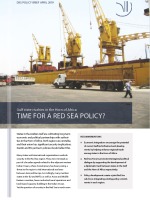Port polities - Logistics, political orders and new hegemons in the land-sea nexus
This project examines the production of political orders around deep-sea ports in Africa. As part of global logistics networks, deep-sea ports are currently expanding and proliferating. In Africa, this development is often supported by parastatal logistics companies from states such as China, the United Arab Emirates (UAE) and Saudi Arabia. Focusing on the intersection between territorial states, corporates and non-Western hegemons, the project asks: What kind of polities emerge around ports, and with what consequences for the political order of host states?
Illustration © UN Photo on flickr.com copyright license
Follow Port of Doraleh, Djibouti
Research and activites
Contact

Photo/illustration by Lynggaardhansenfoto.dk

Photo/illustration by Lynggaardhansenfoto.dk


